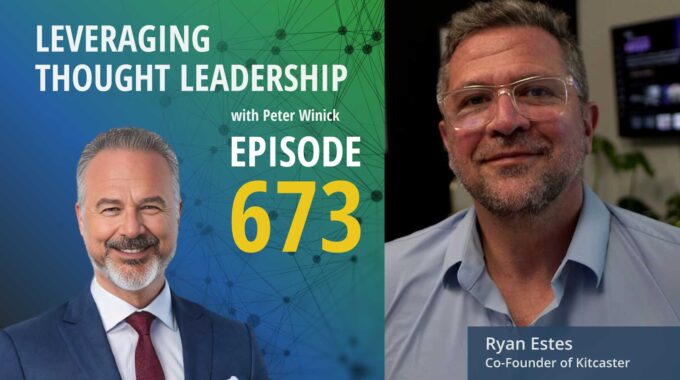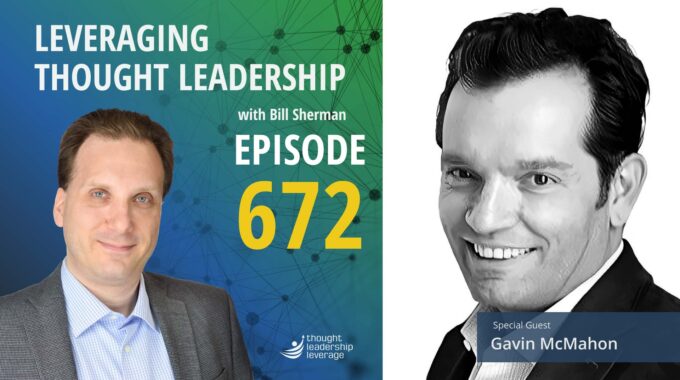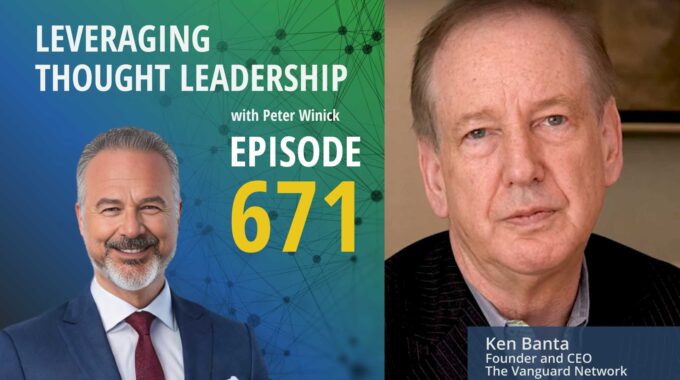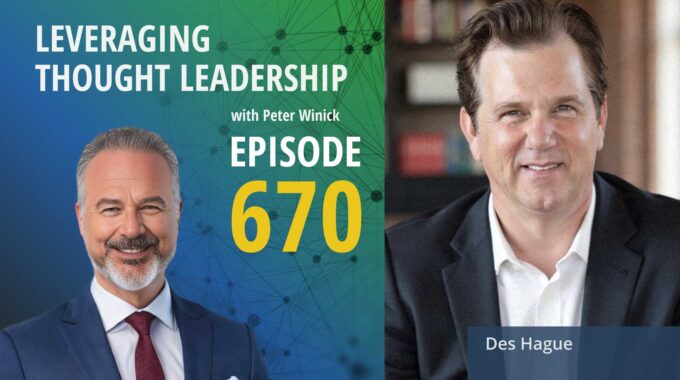Founder-led marketing, podcast strategy, and the art of authentic conversation What makes a podcast truly…
Transitioning into Thought Leadership | Bennie Fowler
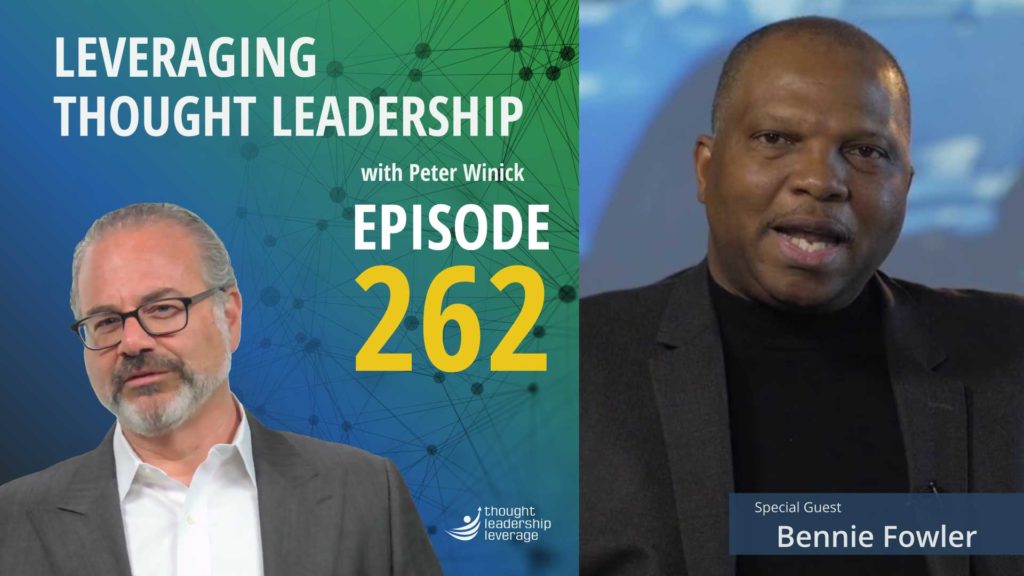
Today’s guest is Bennie Fowler, former Group Vice President, Global Quality and New Model Launch at the Ford Motor Company. Bennie has taken his 40 years of executive experience and is now President and CEO of Bennie Fowler LLC where he is helping clients with their most challenging and complex business problems.
Bennie shares where his passion for thought leadership comes from and how his decades of experience in the C-Suite have played a big role in his ability to help others now. We discuss how teams can deliver quality and productivity at the same time when good leadership is in place. In addition, Bennie talks about how he wrote down and documented the various processes he was involved with at Ford and how those practices have helped in creating content for his new venture.
If you are an executive thinking about making the jump to thought leadership, this episode has some great advice on what you’ll need to do to create a road map to success in a new career.
Three Key Takeaways from the Interview:
- Thought leaders can use the years of experience in previous role to develop new content.
- Thought leaders need to be able to adjust and adapt to the needs of their clients.
- When transitioning from executive to Thought leader you’ll want to have a road map of where you want to go and who you want to help.
If you are transitioning into thought leadership and need advice as you make the move, contact Thought Leadership Leverage for assistance. We can help devise a strategy that will propel you forward and help you reach your target audience. We can also provide help with other aspects such as marketing, branding, research, and sales.
Transcript
Peter Winick And welcome, welcome, welcome. This is Peter Winick. I’m the founder and CEO of Thought Leadership Leverage. And you’re joining us on our podcast today, which is Leveraging Thought Leadership. Today, my guest is Benny Fowler. Benny is an interesting gentleman. He is a C-suite exact with more than 40 years of leadership experience. We would have half the time of the show if I went to his bio, but he was a group VP of Global Quality, a new model launch at Ford. He was VP of Advanced Manufacturing Engineering at Ford CEO, a Jaguar and Land Rover, and he was basically on the C team at Ford for a number of years before spending a stellar career there, and then decided instead of just relaxing and chilling out, let me dive into this world of thought leadership and share my knowledge and such with the rest of the world. So welcome to this phase of life and how are you today?
Benny Fowler Well, thank you, Peter, for having me, and I’m looking forward to our conversation today.
Peter Winick Yes, that’s so nice. So what was the it clearly during your career, you didn’t have a ton of spare time, right? I would imagine demanding roles, $140 million operations. You know, you didn’t have tons of PTO or spare time to sit around and ponder the universe and all that. What was it that what was the spark that said, you know, at some point I’d like to spend more time talking about leadership and all that. Where did that come?
Benny Fowler Well, I mean, I guess it really started early with me being a captain of a baseball team or a basketball team. First, to get into your first real leadership positions. And you really if you had high school or in college, you go to go to center court and you’re representing a team, you know, in terms of your ticket to the coin toss and things like that. So you really don’t understand then until you get a chance to try to reflect on the challenges of actually being the leader of someone to start a club. The actions that you do every day, the performance that you have to say, Hey, you’re going to be the captain of the squad because you set an example for others might want to conduct themselves. So when you really start to think about that at a very early age is when you’re me and I was a captain of my team when I was in high school in college. And, you know, as you start to move on to life, you get your first leadership role as a as a production supervisor, as an intern or, you know, reading people that have more seniority than you are.
Peter Winick So let’s stay on that sort of this concept between there’s a symbolism of, Wow, it’s cool. You get to go to center court to do the coin toss. That’s what it must mean to be the captain. That’s like .01 percent of what it actually is, right? What’s all the other stuff that isn’t as visible or public or symbolic that really matters being on the court or in the boardroom?
Benny Fowler Well, I mean, I think anyone that goes to the gets nominated as a captain, there are certainly work ethics and things that you have to display is the preparation of yourself first, because I think that’s the major thing that you have to manage if you’re going to be good at anything or you have to be first to be able to be led. And then at some point you observe people that are leading and then you become a leader yourself. And I think that was also an important element. I think that every leader of is has to bring has to bring people together. And I think that’s the biggest thing that that I learned from the whole situation is if you’ve got if you’re going to lead, it’s really about organizing individuals around a common cause and really heading in the direction that you want to go. So this this whole concept of leading and being led and working together as a team is this is probably the biggest thing that you learn in anywhere or in any boardroom, in any place you’d be in. Because the big thing is we know that there’s teams that always have talent, but they can’t win.
Peter Winick Right?
Benny Fowler And I think that there are certain things about being the leader. Sometimes you have to sacrifice a bit yourself, and the desired outcome should be the notion of leading and thought leadership is something that I’ve been thinking about for a long time and certainly making the transition, I have a bit more time to think about it than I did when I was going from place to place, really trying to make a difference in people’s life and business. When I was coaching little kids or, you know, running a plant, running a business, running a larger business and scaling to a global level, it all changes.
Peter Winick So when you chose to transition and say, Listen, I’m going to retire from Ford, I’ve had a stellar career, I could do many things. At this point, I can do nothing right. I could travel, I could do nonprofit work. I could serve on boards. You know, there’s the right mix there. What was it about sort of thought leadership and speaking and all those things that sort of drew you to it? Right. And this is sort of my first piece. And then what research, if anything, did you do to say, yeah, this might be the path, this might be the way I would do it.
Benny Fowler Or is a thing I’m still I would call in the transition and obviously feeling like I feel the day, the first six months or so of any retirement you take a chance to, to relax, kind of unwind a bit.
Peter Winick Right.
Benny Fowler And really have a chance to reflect on the things that you want to do. So if you have 40 years of experience. The one thing that I’ve learned is I had to start to write down concepts and things that I wanted to talk about. I want to speak about things that I wanted to be that I was knowledgeable about. And the other part is some of it was what people were asking me to speak about. So, for example, I had 11 years as a global vice president of quality. And what knowledge is that in this industry space is that is delivering quality and productivity at the same time? And maybe you can only have one and you can have the other. But great offer analogy is to be able to deliver both and, and you can do it sometimes in small pockets. But in our in my case it was trying to deliver quality productivity on a large global scale is what many cultures in the world to try to bring it together as one to deliver a unified position, unquote. So building up the experiences and the successes early and to be able to deliver quality and appropriate department development, deliver in the plan, deliver in multiple places in a company and then scheme and then to the sort of levels that we did at the Ford Motor Company when I was doing the quality role there. You actually build up the expertise to be able to have a there for that provided a reservoir for speaking engagements. I mean, I did so in Japan. I did sure engagements in Thailand and different places around the world. And I also did it like I do a lot of seminars where, you know, new vice presidents equal to quality managers and just individuals who want to learn more about the rudiments of quality, not from a theoretical sense, but from a practical setting. Sure, you can read most of the stuff, but when you’re going through these, the what’s it.
Peter Winick Really look like trying to.
Benny Fowler Do is can you help me with this situation I’m facing? And I find that that’s where the biggest level of knowledge can be utilized to help for individuals.
Peter Winick So I want to go back to something that you touched on briefly, which is about writing it down. So in my experience, I’ve worked with lots of C-level executives that have chosen to transition into thought leadership as that next piece. Now some sort of give you the continuum. Some were planning it for years. They knew there was something about the way they the perspective that they had or their sort of personal operating system or their leadership framework or team framework, whatever. They almost became, quote, famous for it, either inside their company, inside their industry, etc.. And they knew at some point they wanted to go out there, write a book and do all those things. And many were writing throughout the years. Were you are you would you consider yourself a writer? Were you constantly jotting down thoughts and nuggets and sort of leadership tidbits and such? Or did you only start doing that during the transition phase?
Benny Fowler What I think that I would say that in order to deliver quality operating system, one of the things that we had to do is write that down and start to write it down and document it early. Inside of four, we created a quality product and inside the quality college. Obviously the theory of what we were trying to teach, a theory of what we were trying to practice and what we wanted to put in place were the elements that we wrote down that we taught that we would follow up. I would say to all of my people that I would go visit. It’s an open book test. So it was written down, and every time I come in, I’m not going to try to surprise you with something new around. What we want to implement is a is a standardized system that we.
Peter Winick Want to pretty clear.
Benny Fowler We want you to be proficient at it. So go from a novice to a user to an expert and being able to practice and deliver world class quality products on a consistent basis. I would say that you start to write these elements down and they become a part of the operating system or the operating methodology that you’ve now got to listen out of a system like board. They have their own pieces of their quality operating system, but everywhere you go, every organization has concepts that they’re trying to deploy to deliver the products and services that we have. So I’m sure the key point is learning the concepts and how they’re applying that given settings that you go into. So you’re really not trying to make it a cookie cutter approach. But I do have basic concepts that I know that work, no matter where you go because is a design is it’s got to be built and we have to ship it at a certain quality level. So those are the basic concepts to use and deliver and work well for you. Yeah. And then with productivity to go to break this down so they don’t have to be exclusive, they actually come together. Sure.
Peter Winick Execute and marry the two. If you’re enjoying this episode of Leveraging Thought Leadership, please make sure to subscribe. If you’d like to help spread the word about our podcasts, please leave us a review and share it with your friends. We’re available on Apple Podcasts and on all major listening apps as well as at ThoughtLeadershipLeverage.com/podcasts.
Peter Winick So when you started to go down this path and I get that it’s fairly new for you, you took a deep breath, right? And you said, okay, let me come up with some sort of a plan, some sort of a strategy, Right. What would this look like? What is the life that Benny wants to live now? Right. I mean, you spend a lot of time on the road. Maybe you don’t want to replicate that. You’ve had thousands of people working for you. Maybe you don’t want to replicate that. So give us an overview of sort of the canvas and what the strategy looks like for sort of this this new phase in your career.
Benny Fowler Well, I. I decided that I was going to be on the road. As this one because I really wanted to start my own business. I wanted to be a CEO. And I know that if you’re going to be one, whether you have your own business or if you’re going to prepare yourself to do speeches or whatever, being the first, I would say 90 days out and I had three speeches before, I actually know people start to learn that I was transitioning. So I was able to book some of the speaking engagements and they put me on the road to be able to do them. So I knew that if I was going to be in this this discussion call about leadership before the pandemic hit, one of the things that I thought that I would really want to do is to travel a bit because that would keep me from not doing things. And I also really wanted to for a larger business associate or CEO. So those are things that I still had in my mind that I wanted to do, but I wasn’t going to rush out and just take anything. I was going to take my time. Sure, there was something that I felt like that I could be a part of that was bigger than me and they needed my help. Those are the kinds of situations that I’m still looking for today. So therefore, being a part of discussions with people like yourself who have been in this business for a long period of time, you actually look, learn research and then you try to modify your strategy as you go over time. So I don’t really have a cookie cutter example that says do it this way, etc.. I mean, now there’s a different type of clientele building because there are a series of mid-level managers who really need help. Yep, they know I’m available, so they’re reaching out for the help and so therefore I’m still able to support these individuals growth and development, which is really what I love to do.
Peter Winick Sure. So more of a little bit of a coaching advisory sort of support. Well.
Benny Fowler Yeah. So one of the things I wanted to just add, I know the greatest success I’ve ever had is when you’re able to develop a strategy and then actually personally involve yourself in the coaching of the individuals to help deliver the strategy for a lot of strategies fail because we just don’t spend the time doing what I’ll call personnel develop and we promote people. They’re very talented people. And then when you when you go from one level to the next level, the scale changes enormously. So things that you have to do as you get into these larger positions, they change and.
Peter Winick Well, the easy stuff is the systems and processes, right? So when you get to TQM and systems and processes and Six Sigma, those are not easy disciplines, but that actually becomes the easy stuff relative to the people side of the house, right? Most of the.
Benny Fowler Tools that you can use, but you have to use them and deploy them in a profound way in order to deliver the results. I mean, you can have Black Nelson grade belts. Yep, Yep. Really just help. But when you try to apply them in the context of larger systemic moving pieces, that’s where the rope comes in.
Peter Winick So what are the surprises? Let’s say the 2 or 3 surprises, I think of it that have been that you’ve been exposed to relative to transitioning to this. Right? Because you’ve had lots of taste of success both on the ball field, in the boardroom and everything in between. And now you sort of come at this thing as a novice, right? And it’s kind of rare in life that we get to sort of jump ship and say, whoa, I got to have a beginner’s mind here. So what what’s been 2 or 3 things that have been surprising you, either positive or negative, whatever the case may be, as you start to take this journey?
Benny Fowler Well, I’m doing almost everything that I’ll talk to you about. It’s an opportunity because I still think that no matter what we think about businesses in the United States, there’s still a portion of the business that need operating systems. Sure. That need to understand the concepts. And if they put leaders in place that do not understand the notion of operating systems inherent what I call the short sprint mode, all that. So we’re going to call it a pump and dump. And there’s certain people when they become CEOs, that’s what their challenge is. They will go in and they know that it’s a short term sprint for them and that’s what they do. And when they leave, there’s a lot of casualties behind them. I think that, you know, surprisingly, there’s probably 25% of the businesses that face us do. And that’s sure, a lot of times what happens in in this Covid situation, the first time that goes to training and development.
Peter Winick Yeah, absolutely.
Benny Fowler So we drop that first. So so there’s if you had people that are in in corporate development programs that would be considered as discretionary. Sure. It’s not a surprise, but it is what’s happening. And so, therefore, I know we certainly have to be prepared. And in my case, there are clients that I know that I’ve had to work with on a discounted rate because they wanted to stay with the programs but couldn’t afford to play the way we would normally do it. And so therefore, for us as leaders starting business, you have to be able to adjust and adapt to the client’s needs. And those are the things that I have been doing as I’ve as I’ve gone through this challenge just like anyone else.
Peter Winick Yeah. And I think, you know, I mean, training and development is one piece of it. I mean, we’re, we like in business certainty. We like absolutes because it’s easy to plan and minimize risk and, you know, do all that. And regardless of what anybody says, these are times of just so many unknowns. There’s some basic things we know but nobody would have predicted. Know, if you think about the Fortune 1000 goes through planning season and risk scenario and whatever. I don’t think there’s one report that had 5% of what we’re experiencing today. You know, no professional sports, you know, on and on and on and on. So I think these times of uncertainty, leadership is critical. And I think that transparency and the honesty saying, you know, being truthful, saying we don’t know all the answers right now. What we do know is we can communicate. What we do know is these are the things that we’re doing. Anything that’s been a surprise to you on the on the positive.
Benny Fowler Or just to take your point, Peter, I wanted to just comment on the point that you are making. And one of the things I wanted to just add is when we had gone through several challenges when I was in the C-suite or and one of the things that we tried to do every day was to prepare for what we would call catastrophic events, not knowing what the event was going to be for be more sure whether these debates matter. But the operating methodology was just really kind of how we approach business every day. And we often say to people in the good times, that’s the time to prepare for the challenges that you may face. You don’t know what they’re going to be. You don’t know how we’re going to do it. But you’re offering a scenario in terms of being together. And I meetings where every pharmacy where we.
Peter Winick Were up.
Benny Fowler In time going through the business in a very rigorous fashion and working on things that special attention and then everything else in our meeting cadence and our governance was a part of the operating system that allowed us to be together and to continually work on preparing for better days if the opportunities were there or challenges like they are now. And the one very good thing about it is and I would just say to most people is you won’t be able to predict everything, but one thing you can’t do is stay together as a team.
Peter Winick Yeah. Great stuff. That’s great advice for anything out of.
Benny Fowler Room as to as to as to what is happening. And I know we were going through one of the what I call the last Great Depression was around 2006 seven, the where companies were going through bailouts. And we know what that was like. One of the things we committed to ourselves is that we would pull up our belts, belt boot straps, and every day at noon, no matter where you were in the world, there would be a discussion on what our priorities were and how we were going to try to make that uncertain time.
Peter Winick In that consistency. Great. Well, this has been phenomenal. Benny, appreciate your time. I appreciate your effort and I wish you well on your continued journey in these unchartered waters. But thanks so much for joining us today.
Benny Fowler All right. Thank you, Peter. Talk to you soon.
Peter Winick Thanks. To learn more about Thought Leadership Leverage, please visit our website at ThoughtLeadershipLeverage.com. To reach me directly. Feel free to email me at Peter at ThoughtLeadershipLeverage.com. And please subscribe to Leveraging Thought Leadership on iTunes or your favorite podcast app to get your weekly episode automatically.


